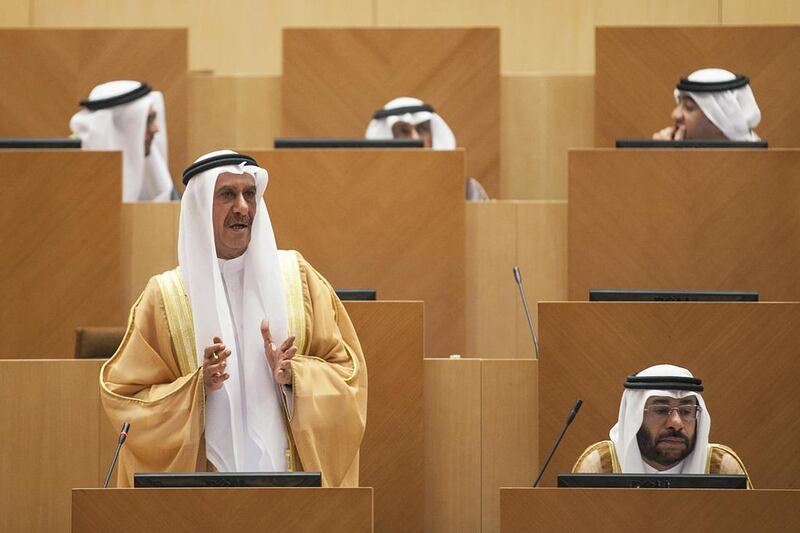ABU DHABI // Changes to the law are needed to protect women against non-violent forms of abuse, legal and social experts say.
The clamour for change has grown since members of the Federal National Council called for a comprehensive abuse law similar to recent child protection legislation.
Ali Jassim, the veteran FNC member from Umm Al Quwain and a long-time campaigner against domestic abuse, said the council is preparing to discuss a comprehensive study which he hopes will lead to a law that would protect women, senior citizens and children. “We finished 80 per cent of it in the previous term, and all we have left to do is discuss it with the justice and interior ministries,” Mr Jassim said.
It followed research and field visits by the human rights committee that started in 2014.
Court cases showed gaps in laws that should have protected women against being jailed in their homes or being subject to passive and psychological abuse.
While law entitles women over the age of 21 to free will, imprisoning a daughter or sister inside the home is not specifically prohibited.
There are laws against restraining another person’s freedom and kidnapping, but within the same family it is hard to prove, said legal counsellor Yazan Al Rawashdeh.
“When a stranger is held captive or kidnapped, it is clear that they have been taken against their will.”
However, in the case of a Jordanian woman who was held by her husband and in-laws at home for three years, it could not be proven.
“She was only allowed to speak to her family back home twice through the three years. And she only left the house once since she arrived with her husband.”
When she filed for divorce and damages in UAE courts, she lost because she lacked evidence and her in-laws testified against her.
However, when she refiled the case in Jordan she won in the first instance and beat appeals.
A comprehensive law that covers women rights’ issues could provide context and detail, said Ahmad Abdulazeem, a senior legal counsellor in Abu Dhabi.
For instance, the personal affairs law allows a husband to hold his wife at home as long as he sponsors her financially and allows her to visit her family. However, the law has not covered what should be done if the husband prevents his wife from using communication methods and, therefore, is unable to report abuse, he explained.
The law also limited action by the woman’s family members. Mr Abdulazeem described a case where a woman escaped her husband and called her father and brother to rescue her after she locked herself in her room.
After they arrived and entered the house, the husband accused them of entering his home without his permission and they were found guilty by the court of misdemeanours and faced fines.
The husband did not face charges because the potential attack could not be proven.
“The judge concluded that if she was in danger she would have called the police. But if we consider the emotional situation the wife was in, she was scared and panicking,” said Mr Abdulazeem.
Even when the damage is proven, the husband always gets off with a fine the first time, plus a suspended sentence the second time, he said.
“In cases involving spouses, the judges try to give more lenient penalties to avoid damaging and breaking the family.”
For instance, a husband who beat his pregnant wife, causing her to miscarry, was only issued a suspended three-month jail sentence.
“The pregnancy was less than three months, so the court considered it an attack – a misdemeanour, and not murder.”
According to Dr Rima Sabban, a social researcher and sociology professor at Zayed University, “every society needs laws to protect what goes on in closed doors”.
She referred to “inhumane cases” that she knows of but has not been reported because the society is tribal and “you cannot talk about someone in the family and cannot talk to the police about this abusive person”.
She believed improved laws will help break the silence. “So from experience I am telling you we need more laws and regulations.”
hdajani@thenational.ae







